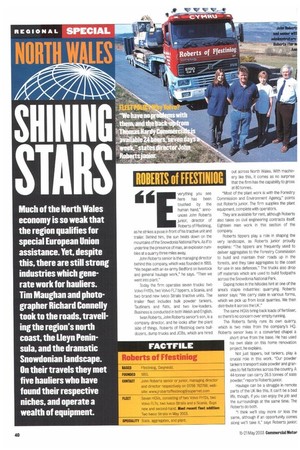S the taitem S TARS
Page 40

If you've noticed an error in this article please click here to report it so we can fix it.
Much of the North Wales economy is so weak that the region qualifies for special European Union assistance. Yet, despite this, there are still strong industries which generate work for hauliers. Tim Maughan and photographer Richard Connelly took to the roads, travelling the region's north coast, the Lleyn Peninsula, and the dramatic Snowdonian landscape. On their travels they met five hauliers who have found their respective niches, and operate a wealth of equipment.
'E ' here has been Everything you see touched by the
human hand," announces John Roberts junior, director of Roberts of Ffestiniog, as he strikes a pose in front of his tractive unit and trailer. Behind him, the sun beats down on the mountains of the Snowdonia National Park. As if to underline the presence of man, an explosion rumbles at a quarry three miles away.
John Roberts senior is the managing director behind this company, which was founded in 1955. 'We began with an ex-army Bedford on livestock and general haulage work," he says. "Then we went into plant."
Today the firm operates seven trucks: two Volvo FH125, two Volvo FL7 tippers, a Scania, and two brand new Iveco Stralis tractive units. The trailer fleet includes bulk powder tankers, Tautliners and fiats, and two low-loaders. Business is conducted in both Welsh and English.
lwan Roberts, John Roberts senior's son, is a company director, and he looks after the plant side of things. Roberts of Ffestiniog owns bulldozers, dump trucks and JCBs, which are hired out across North Wales. With machinery like this, it comes as no surprise that the firm has the capability to gross at 80 tonnes.
"Most of the plant work is with the Forestry Commission and Environment Agency," points out Roberts junior. The firm supplies the plant equipment, complete with operators.
They are available for rent, although Roberts also takes on civil engineering contracts itself. Eighteen men work in this section of the company.
Roberts tippers play a role in shaping the very landscape, as Roberts junior proudly explains: "The tippers are frequently used to deliver aggregates to the Forestry Commission to build and maintain their roads up in the forests, and they take aggregates to the coast for use in sea defences." The trucks also drop off materials which are used to build footpaths across the Snowdonia National Park.
Gaping holes in the hillsides hint at one of the area's staple industries: quarrying. Roberts senior says: 'We carry slate in various forms, which we pick up from local quarries. We then distribute it across the UK."
The same HGVs bring back loads Of fertiliser, so there's no concern over empty running, The Roberts family runs its own quarry, which is two mites from the company's HQ. Roberts senior lives in a converted chapel a short drive from the base. He has used his own slate on this home renovation project, he explains.
Not just tippers, but tankers, play a crucial role in this work. "Our powder tankers transport slate powder and granules to felt factories across the country. A 44-tonner can carry 26.5 tonnes of slate powder," reports Robertsjunior.
Haulage can be a struggle in remote parts of the UK like this. It can't be a bad life, though, if you can enjoy the job and the surroundings at the same time. The Roberts do both.
"I think we'll stay more or less the same, although if an opportunity comes along we'll take it," says Roberts junior.




























































































































































